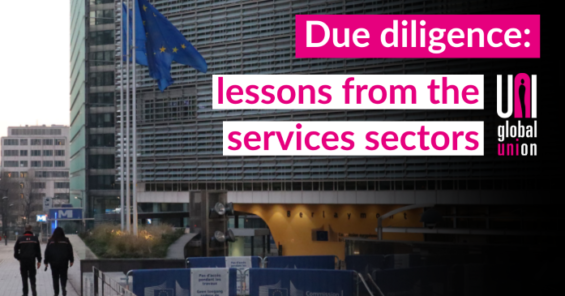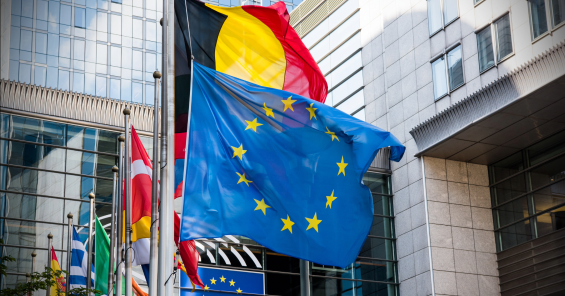Mandatory human rights due diligence is on the horizon. The Council of the European Union has given its backing to the European Commission’s commitment to initiate binding legislation. Across many EU member states there is also traction for national level legislation. A hot debate however remains on what exactly the legislation should look like on core questions including the scope of businesses covered and how it should be enforced through liability regimes.
Among the human rights that this legislative effort seeks to enforce, the fundamental rights of freedom of association and collective bargaining rights have play vital role. Too often corporations are able to punish workers for exercising their rights to form and join unions in complete impunity. When workers are unable or too scared to speak out when they experience or witness abuse, accountability is gravely undermined. In that respect, freedom of association and collective bargaining are considered ‘’enabling rights” as they allow for the fulfilment of other human rights.
The voluntary approach to due diligence is now widely recognised to have failed. Only just over one-third of businesses surveyed in the context of a European Commission study on due diligence requirements, indicated that they take all human rights and environmental impacts into account.
Even of these limited number of leading companies that currently conduct human rights due diligence, only a minority recognise and act upon freedom of association and collective bargaining as salient rights – despite their status as fundamental rights and their importance in protecting other human rights. Furthermore, the current lack of binding rules means those corporations that do state they have a due diligence process often rely heavily if not entirely on self-reporting or social audits, the deep flaws of which are well-established.
Enforcing human rights
Collective bargaining is key to ensuring accountability and enforcing human rights. The European Commission has recognised the value of collective bargaining and is tabling measures aimed at reaching 70% across member states. Multinational corporations will be central to achieving this objective. Due diligence legislation can contribute by building transparency in terms of a company’s coverage and require company action plans that deliver.
The means of enforcement and access to justice are major points of contention in the developing legislation. Robust enforcement is needed first and foremost to prevent harms from occurring, incentivising companies to clean up their act or face repercussions for failing to do so. To ensure due diligence is done effectively and with accountability, trade unions – at the national and international levels – must have a role in designing and implementing companies’ due diligence processes.
Legislation must also provide for access to justice. While many workers understand their rights, all too often they do not have meaningful access to justice to enforce them. Legislation must build in provisions for access to remedy for victims, alongside wider enforcement mechanisms.
One tension in the current debates is whether some companies and sectors should be excluded. Much of the debates have highlighted traditionally “high-risk” sectors for human rights, such as mining or manufacturing. But, as UNI has experienced time and time again, the services sectors can also be extremely high risk for human rights, particularly workers’ rights. The importance of these sectors is not to be underestimated as they are the fastest growing sectors and make up many of the world’s largest employers.
Services sectors
On a recent call with members of the European Parliament, the European Commission, and other key decision-makers and stakeholders, an overview of three case studies helped to shed light on the need for legislative action that addresses the lapses in fundamental labour rights in the services sectors.
Teleperformance is a contact centre corporation that employs 330,000 people in 80 countries. It has been involved in a number of scandals around alleged breaches of its workers freedom of association. It recently unfairly terminated the contracts of two workers who had been active members of a newly established union. One of those workers, Zuzanna Hansen shared her experience of this unjustified action, its impact on her life and on the rights of her ex-colleagues to join and form unions. This testimony showed that breaches of workers’ fundamental rights are a reality here in the EU. Mandatory due diligence is needed to ensure the fundamental rights within global value chains but also within our own countries.
“I believe I was fired from @Teleperformance because I joined a union and was talking to other employees about the union.”
️Zuzana, who worked for the company in Poland
French contact centre giant #Teleperformance is a prime example of why mandatory EU #DueDiligence is needed. pic.twitter.com/QhNzLplpwa
— UNI Global Union (@uniglobalunion) December 8, 2020
While it is a problem in the EU, it is also a problem in other countries of similar economic development. Fresenius is a major multinational corporation operating in the care sector and headquartered in Germany. While it respects freedom of association and collective bargaining in its home country, Magellan Handford RN, a worker in the USA, testified to the intimidation practices of management in other national contexts. These anti-union tactics create a culture of fear such that workers are unable to freely exercise their rights. With most of his colleagues having to work two jobs, many working six days a week, this shows the suppression of basic conditions that this anti-union behaviour has led to and the need for binding rules to address it.
“@Fresenius sent union busters into our clinic. They have even taken us from our patients to hold anti-union meetings. They created an atmosphere of surveillance and intimidation.”
️US dialysis nurse Magellan’s experience w/ the German giant shows why we need EU #DueDiligence pic.twitter.com/f9ezTi3g8S
— UNI Global Union (@uniglobalunion) December 8, 2020
Employing 533,000 workers across 90 countries in the extremely high-risk private security industry, G4S demonstrates the stakes at play within services sectors. Marvin Largaespada, Regional Director of UNI Americas Property Services, laid out the challenging environment in Latin America for workers to exercise their rights. He shared how the global framework agreement between UNI and G4S enabled workers to form unions in risky environments including Colombia, Paraguay, Nicaragua, El Salvador and Peru. He also highlighted that the global agreement allowed for resolving difficult situations, although many ongoing challenges still remain. But, he highlighted these types of agreements are not sufficient to minimise these risks for the future – rather we need to have mandatory human rights due diligence to ensure fundamental rights are protected in practice.
We hear from South American trade unionist about how #DueDiligence would help ensure the success of EU-based corporations is based not on exploitation but on #DecentWork conditions for the workers they rely on.#BizHumanRights pic.twitter.com/TLDu7rK9b5
— UNI Europa (@UNI_Europa) December 8, 2020
While there are numerous examples highlighting the complicity of certain corporations in undermining workers’ rights as well as the gravity of the situations in which they force their workers, it is important to note that some corporations have joined the call for mandatory due diligence. Dutch bank ABN AMRO participated in the call to explain their support. Arguing for more transparency and accountability, to identify and address risks before they snowball, they indicated that mandatory due diligence could deliver stability to business operations. Other business groups have also voiced their support – most recently with Business for Inclusive Growth signatories adding their support on Human Rights Day.
A key moment with the European Commission still in consultation on their legislative initiative. It is crucial that the trade union movement have a say in shaping human rights due diligence legislation that effectively ensures companies take responsibility for the human rights of all their workers – including those in the services industries. Together with its affiliates, UNI will be working closely alongside all those advocating for this to make this a reality in the year to come.
Links:


